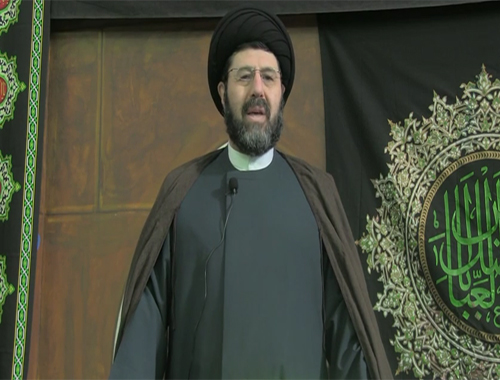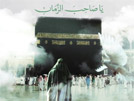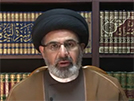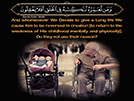D. TADBIR & TAQDIR (Our Plans & God's Decree)
- Details
- Hits: 4509
D. TADBIR & TAQDIR (Our Plans & God's Decree)
It was mentioned in Chapter Two that though the power and opportunity to do a certain work is given by Allah, the ultimate responsibility is ours because we opt to do or not to do that work by our own free will and choice. Thus, while the tools of our actions are provided by Allah, the final choice is ours.
It is interesting to note that to a certain extent in matter of predetermined measures, the opposite is true, that is, while the preliminaries are provided by human beings, the final decision is in the hands of Allah. (Mark the phrase 'to certain extent'. I have used this phrase because the decree of Allah is not 'always' dependent upon our actions:) In this context, our action and planning is known as tadbir, while Allah's dcision is known as taqdir.
To give you one example, if we want to reap a harvest, we will have to cultivate the land, sow the seed, irrigate the plants, weed out the grass and remain always on alert.
Still, after doing all that was necessary, we cannot be sure of getting the harvest. A cyclone, a fire or a lightening may destroy the produce; armed gangs of robbers may attack; circumstances may force us to sell the farm just before the harvest, and so on. Thus while the preliminary stages are prepared by us, the final outcome of that venture is in hands of Allah.
Two of the matters which are of day to day interest to the readers and which are under the direct control of Allah, are life and death, and the means of livelihood. In the following pages, some light will be thrown on these two subjects.
1. Life & Death:
Allah says, "He is the one who has created you of clay, then decreed the term; and the predetermined term is with Him; and yet you doubt."(6:2)In another verse, it is said, "And ageth not any aged, nor is reduced from any one's life, but it is all in a Book; verily it is easy for Allah.”(35:11)
These two verses, and especially the last one, show that the life‑span of a person is liable to be increased or decreased by the decree of God. And the first verse speaks of a "term" and a "predetermined term" which is with Allah. What do all such references mean?
The idea may be understood easily in the light of the previously mentioned two lawhs (see Chapter Four). For example, Allah decrees that Zayd would live up to hundred years; but if he behaves badly with his relatives, his life‑span would be reduced, lets us say, by thirty years and he would die at the age of seventy. This is the direction given to the angel of death. The angel of death does not know how will Zayd behave with his relatives. Therefore, he cannot know whether Zayd would live up to hundred years or would die at the age of seventy.
Now suppose Zayd behaves badly with his relatives. At the end of seventy years, the angel of death must seek guidance from Allah about him. Allah tells him to erase the hundred years, and replace it with seventy years. And Zayd dies. [3]
Thus the knowledge or information of the angel of death is constantly being updated. This is how the decrease or increase in the life‑span of a man is effected. And it is the knowledge of the angel of death which has simply been called as a "term" in the first verse. But what about Allah's knowledge? Allah knew from ever that Zayd would die at the age of seventy. There was no change in His knowledge. The actual life‑span of an individual is known to Allah only; and that life‑span has been termed as a "predetermined term" in the first verse
Question: Why Allah did not decree a fixed age for all human beings?
Answer: So far as human being is concerned, Allah has designed everything with only one purpose: to help him to acquire virtues and become an obedient servant of Allah. It is precisely for this reason that he has been informed that his life‑span can be effected by his deeds. When a man knows that, for example, by being generous to his relatives, he will live longer in this world (and that this immediate reward is quite separate from the rewards of akhirah, the hereafter) he will naturally try‑ to be good to his relatives. And thus he would become a virtuous servant of Allah.
2. Sustenance & Livelihood:
Though trying to earn a livelihood is within the sphere of our activities, the final result is not within our power. We see many people endeavouring hard from sunrise to sunset to earn livelihood and still they spend their lives in constant poverty and need.
Why is it so? Allah says, "Allah expands the sustenance for whomsoever He desires and straitens it for whomsoever He desires. " (13:26)
Similar to what we mentioned about human fife‑span, sustenance also may be of two kinds: For example, Allah may inform the angels‑ that if Zayd endeavours hard he will be given ten thousand doll,. But if he does not eudeavour so hard he will be given five thousand. Allah knows whether or not Zayd will endeavour; He:knowws whether finally he will be given ten thousand or five thousand. But Zayd himself does not know and the angels who are able for his sustenance do not know the final outcome. The purpose of keeping every one in suspense is that because of this suspense, man will always try to work up to his utmost capacity to earn more and more; also he will try as many hopeful lines as he can, because he does not know whether he has readied the final stage of his sustenance or not. He does not know .where his better livelihood lies. Therefore, he will always be on alert to try as many opportunities as will come his way. He will remain active and ambitious, and constantly in search for a better life.
According to the verse of the Qur'an and writings of the 'ulama', I have come to the conclusion that Allah has fixed a maximum limit for the livelihood of every person. Try as he may, he cannot go beyond that maximum limit. As the maximum limit is hidden front our eyes and, as a matter of act, even from the eyes of the angels, we cannot or at least should not sit idle without endeavouring to better our condition.
Also, it has been left to our choice whether we want to reach that goal by lawful way or through unlawful means. If we adhere to the commandments of Allah and to the tenets of religion, we will reach the desired limit and, at the same time, will earn the grace of Allah in the hereafter. If we choose the unlawful way, we may get that sustenance; but our allotted share of lawful sustenance will be reduced by that much, and by opting the wrong method, we will make ourselves liable to the pent from Allah in the hereafter. [4]
It must be remembered that in. Islam even a lawful thing becomes unlawful if it is obtained by unlawful means. In Islam, the end does not justify the means. There is no denying that lawful methods sometimes seems to be slow, and therefore those people who want to get rich overnight resort to unlawful means. But such tactics do not benefit very much. The following episode will make my point more clear:
Imam 'Ali (peace be upon him) went to a mosque where he wanted to pray. He asked a man standing nearby to look after his horse. When he came out, he had two dirhams in his hand which he intended to give to that man as reward. But that man was nowhere to be seen. Imam 'Ali came to the horse and found that his rein was missing. He gave someone the two dirhams to buy another rein. The man went to the market. He saw a man selling a rein and bought it for two dirhams. When Imam "Ali saw the rein, he recognised that it was his own. rein which the supposed guard had stolen. Imam 'Ali had intended to give that guard the same two dirhams as a reward which would have been perfectly lawful for him. But his impatience turned him into a thief and he got nothing except the same two dirhams. His anxiety did not increase his wages at all and made him a criminal into the bargain.











